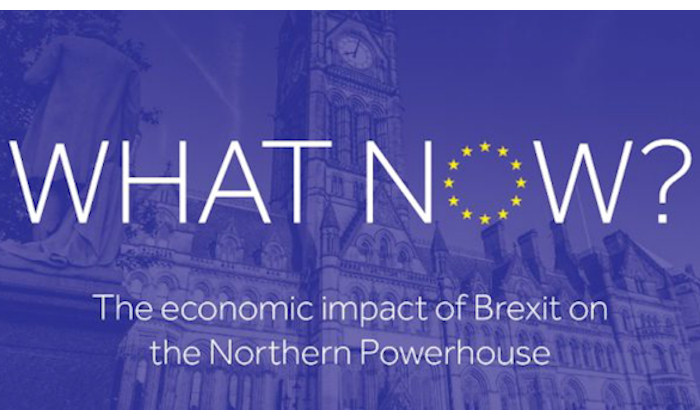Brexit “phoney war” will soon be over
30 Sep 2016
We are still in a “phoney war” in the wake of the Brexit vote with the hard reality of the UK’s decision to leave the EU yet to be seriously felt, our latest Vital Topics debate heard

Our panel of distinguished economic and political voices, discussing the economic impact of Brexit on the Northern Powerhouse, agreed that the full impact of the referendum vote would take some time to feed through to the economy – but when it did the consequences will be far-reaching.
Simon Derrick, Chief Currency Strategist at BNY Mellon, said: “Since the vote we have had a phoney war because, put simply, we have not left yet. But I fear the economic numbers will change as the hard reality of what we have to negotiate starts to kick in. Sitting here now there seems to me a false optimism, and the things supporting that optimism could disappear very quickly.”
Diane Coyle, Professor of Economics at the University of Manchester, added: “The full impact will take time. It is only when we start to see deals not done, research grants lost, or investment not going ahead that we will start to see that impact.”
Article 50
Sajjid Karim, Conservative MEP for the North West, believed the government would trigger the UK’s exit via Article 50 at some stage in the first quarter of 2017. “It would show seriousness of intent and provide a timeframe for us all to start working towards. At the moment the politics of this is still in flux.”
He said EU partners were not actually surprised by the result. “What was surprising to me was that we were shocked by the result. In Brussels there was no shock and always an expectation that nothing good would ever come out of holding the referendum. What people keep telling me now is ‘tell us what do you want and how it can be delivered’. That is about where we still are right now.”
Asked how the financial markets would respond to the Article 50 trigger, Derrick said this would depend in part on what global markets were doing. But he added: “In the immediate aftermath of the vote allowing the pound to fall was a sensible thing to do, but this does not disguise the fact that there is still a long way to go. When Article 50 is triggered I think the pound will take the immediate strain again, but I also think that over time the UK markets will suffer and there will be a drag on markets.”
Coyle said when it came to negotiating future trade deals as part of Brexit people had overlooked the fact that British manufacturers are part of supply chains that spread across many countries. “Will these companies now get cut out of supply chains? A lot of trade deals will not cover these areas and we need to be very cautious about the types of deals done.”
Devolution
She added that following the vote the UK now had an opportunity to change the kind of economic model it operated in response to the shock.
“We need a policy response. Part of that change could be a move towards a more decentralised economy. I have always been a supporter of Northern Powerhouse and devolution and we need to double down on the detail of that. We also need a regional industry strategy and should be thinking about how we take advantage of the current low interest rate environment to invest.”
Professor Alan Harding, Chief Economic Advisor at the Greater Manchester Combined Authority, added: “We need to stick to the devolution path that we thought we were on before the referendum. But we also need to go further and faster. The path we were on with Northern Powerhouse seemed a logical one.”
Karim said the government was committed to the Northern Powerhouse but there were caveats.
He added: “Theresa May has been reasonably clear about the fact that she sees the need for the economy to be far better balanced to make sure we do have a very strong devolution agenda. As far as the Northern Powerhouse is concerned she has provided a commitment…but there is one proviso to all of this and that is ‘economy permitting’. Providing we can sustain our economy and maintain some level of growth then we have a chance of doing this, but if the economy starts to go backwards then I’m afraid things will change very, very quickly.”
